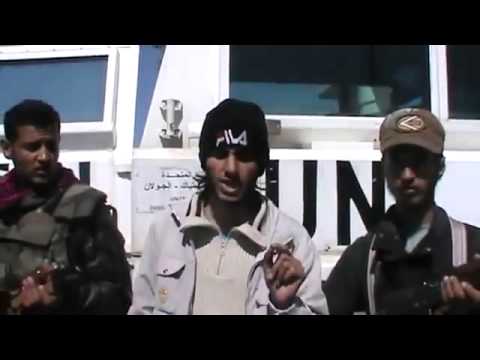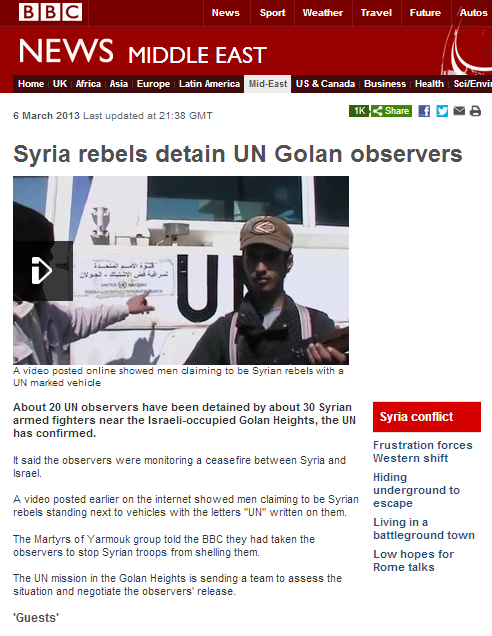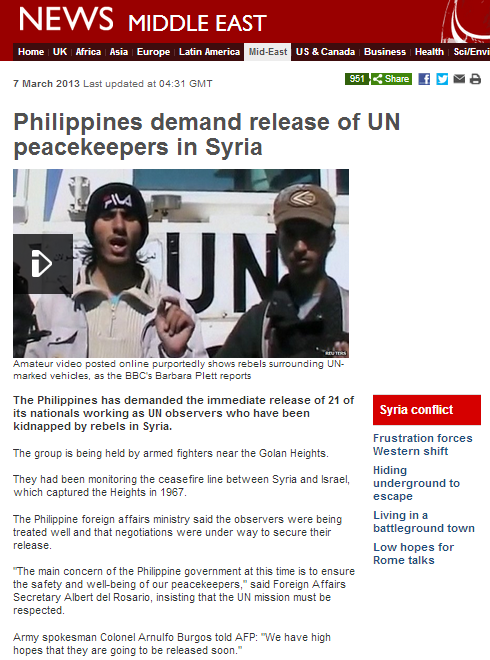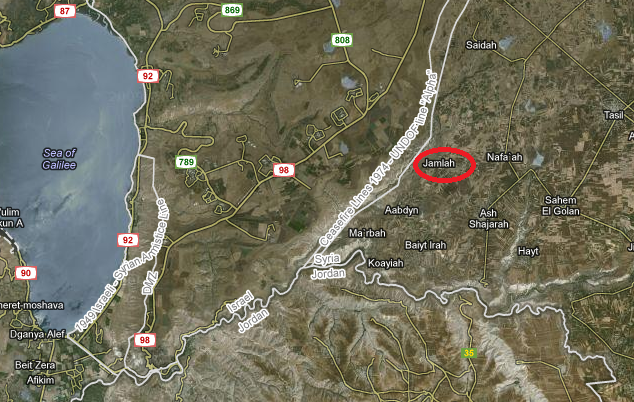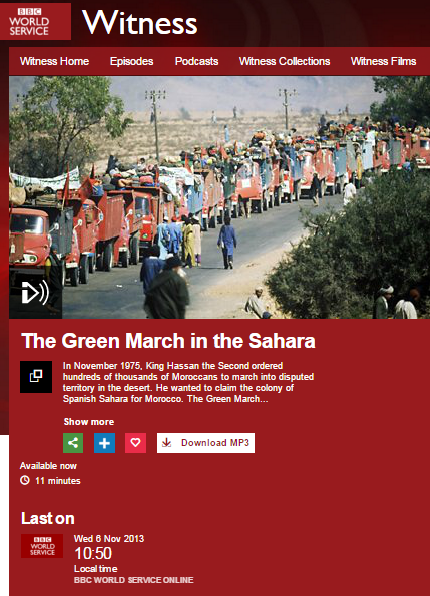On March 6th 2013 some twenty-one unarmed members of the UNDOF forces stationed in the Golan Heights were kidnapped in Syria. Shortly after the incident an article entitled “Syria rebels detain UN Golan observers” appeared on the Middle East page of the BBC News website and another article on the subject – titled “Philippines demand release of UN peacekeepers in Syria” – was published the next day.
Both articles include the same film clip – obviously part of a BBC television news report – which shows parts of a video which was put out by the kidnappers close to the time of the incident.
[youtube=http://www.youtube.com/watch?v=FJA9J0LOM5w]
The BBC’s explanation of the video is as follows:
“These people are announcing that they captured twenty UN observers, asking President Assad to pull his troops from a town – a village – in the Golan Heights called Jable [Jamla – Ed] and it seems they want to attract some attention from the international community to put pressure on Assad because what they announce at the end, that in some…in the coming hours, if they don’t hear anything from the international community or if Assad will not pull out his forces from this village, they will deal with them as prisoners of war and we don’t know what does this mean.”
The kidnappers, who call themselves the ‘Martyrs of Yarmouk’, also released a second video.
[youtube=http://www.youtube.com/watch?v=w-M_YBrPJdw&feature=youtu.be]
What the BBC does not inform its audiences, either in its filmed report or in its articles, is that the kidnappers also accused the UN of collaboration with Assad’s forces, saying:
“They [the UN] say that they want to prevent clashes near the border, but what they want is to cause our soldiers to lose battles so that Bashar al Assad’s people will go into Jamla, because the forces of Assad’s regime are agents of Israel. The UN and the countries of Europe and the regime of Bashar al Assad are agents of Israel. The UN forces want to get the Free Syrian Army out, in order to let Assad’s forces in, because they are agents of the Zionists and of the United States.”
Another speaker says:
“Bashar al Assad’s forces ran away from Jamla six days ago, after they understood that we have no intention of giving in. We will kill Bashar al Assad and his dogs. After six days of fighting in which we succeeded in breaking Assad’s forces, the UN arrived to help them return to here. That is why we arrested these collaborators.”
A curious, but unexplained, paragraph which was later added to the BBC’s first report states:
“The Martyrs of Yarmouk group told the BBC they had taken the observers to stop Syrian troops from shelling them.”
Also added later to the article are the words:
“The rebels later admitted taking the monitors to try to stop the Syrian army from firing on them and civilians in the areas.
The rebels added that the UN team were their guests.”
Later developments seem to suggest that the kidnappers have changed their story since they initially uploaded their videos and are reportedly now claiming on Facebook to have ‘saved’ the UNDOF observers from Assad’s forces rather than kidnapping them.
The BBC’s version of the story describes these men as “rebels”, “armed fighters”, “men claiming to be Syrian rebels” and “gunmen”. Interestingly, it appears to want to suggest that they have nothing to do with the Free Syrian Army.
“Meanwhile, the Free Syrian Army (FSA) – the main rebel fighting force – condemned the seizure of the UN observers.
FSA leader Gen Salim Idriss told the BBC’s Newshour programme he would “do everything what I can to liberate them”. “
As the parts of the videos not shown by the BBC indicate, the kidnappers themselves do not appear to make such a distinction. Coincidentally, the UK Foreign Secretary happened to have pledged armoured vehicles, body armour and other equipment to what he termed “moderate elements” in Syria on the same day as the kidnapping of the UNDOF observers took place. Quite how the UK intends to ensure that the equipment it provides to the FSA does not fall into the hands of this and the many other Islamist groups on the ground in Syria is not clear.
Both BBC articles are notably low key in their treatment of the kidnappings themselves and the situation on the Syrian side of the Golan Heights in general.
“Recently there has been fighting in the eastern foothills of the Golan Heights between Syrian President Bashar al-Assad’s forces and rebels.
Israel has said its policy is not to get involved in the Syrian conflict. However, in recent months it has retaliated when there has been Syrian fire into Israeli-controlled areas.”
In fact, in the days preceding the kidnapping a Syrian tank shell fell in Alonei HaBashan and mortar shells fell in Ramat Magshimim – with no response from Israel and (perhaps not unrelatedly) with neither incident being reported by the BBC. In addition, the Al Qaeda affiliated group ‘Al Furqan’ recently released video footage of its fighters conducting observations along the Golan Heights border.
However the incident involving the UNDOF observers develops, the BBC’s selective reporting of events along the Syria-Israel border and its blurring of the Jihadist nature of some of the groups which make up the forces fighting the Assad regime in that area does not contribute to its audiences’ understanding of the situation, meaning that – as has so often been the case in incidents along Israel’s border with Gazas – if Israel is at some point forced to respond to events, audiences are unlikely to comprehend the reasons for such an action.

